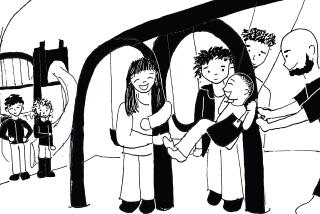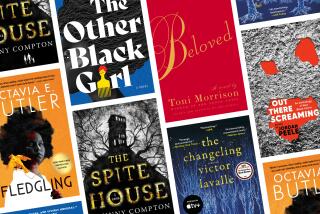‘A.D.: New Orleans After the Deluge’ by Josh Neufeld
- Share via
A.D.
New Orleans After the Deluge
Josh Neufeld
Pantheon: 198 pp., $24.95
In 2007, Smith Magazine serialized a comics treatment of Hurricane Katrina and its aftermath. That work, “A.D.: New Orleans After the Deluge,” tracked the lives of seven New Orleans residents as they fled, remained and struggled to survive and recover not just their things but their lives. Its creator, Josh Neufeld, is best known for his collaborations with Harvey Pekar, whose scripts, highly detailed and paneled, come to life in the renderings of illustrators casually assigned.
Neufeld’s style is in no way haphazard. His drawings are reminiscent less of the superhero than of the Sunday comics page. That doesn’t mean they are youthful or naive. With simple lines -- deft and evocative -- Neufeld communicates complex human emotions. Two- and three-color palettes render the passing days with sober integrity.
As the pages progress, “A.D.” highlights details that are surprising and vivid. As one character, Abbas, slips into denial about the disaster, his decision to remain behind at his convenience store -- with guns and supplies -- becomes indicative of the American dream. Abbas is not stupid; he is hardworking and fearless, and Neufeld casts him with charm and bravado. Denise, who curses the storm as a “bitch,” and the blasé Doctor Brobson, toasting Katrina with a party in the French Quarter, also help humanize a catastrophe that outsizes ordinary understanding. The account of Kwame, shipping off to Ohio for his senior year in high school, simultaneously relates the human ability to adapt and overcome, and the terrible loss of leaving everything behind.
In places, Neufeld’s scripting can be overdetermined. Outside of locations, dates and times, his narrative is conveyed entirely through dialogue, a decision that leads to clunky inclusions of back story. Mechanical moments of foreshadowing also trouble early pages. “Should I move some of this stuff in case we get flooding?” asks one subject, Leo, who also contributes the fateful: “Well, we still need to hope the levees hold.”
And yet, at its finest, “A.D.” sketches the incomprehensible: the storm that covers the city like a palm covering a dime; the buzzing of mosquitoes, septic and insouciant, in the fetid night; the overwhelming memories that leave a survivor bug-eyed and drowning. It is the people’s history of Katrina; their experience of the hurricane, the flood and the government. Neufeld is sensitive to the failure of local and federal authorities as well as to the dangers of gangs and thugs in a blackout of law. But he remains objective -- reporting rather than pointing fingers at either the thugs that were there or specific politicians and agencies that fell woefully short.
The “novel graphic” or “graphic novel” is, in its own way, a return to the book before the printing press -- the illuminated manuscripts, scribes and artists working in tandem. “A.D.” is a work in that tradition: of literature, of high art, and of reverence for nature and humanity.
Reed is a writer living in New York.
More to Read
Sign up for our Book Club newsletter
Get the latest news, events and more from the Los Angeles Times Book Club, and help us get L.A. reading and talking.
You may occasionally receive promotional content from the Los Angeles Times.










